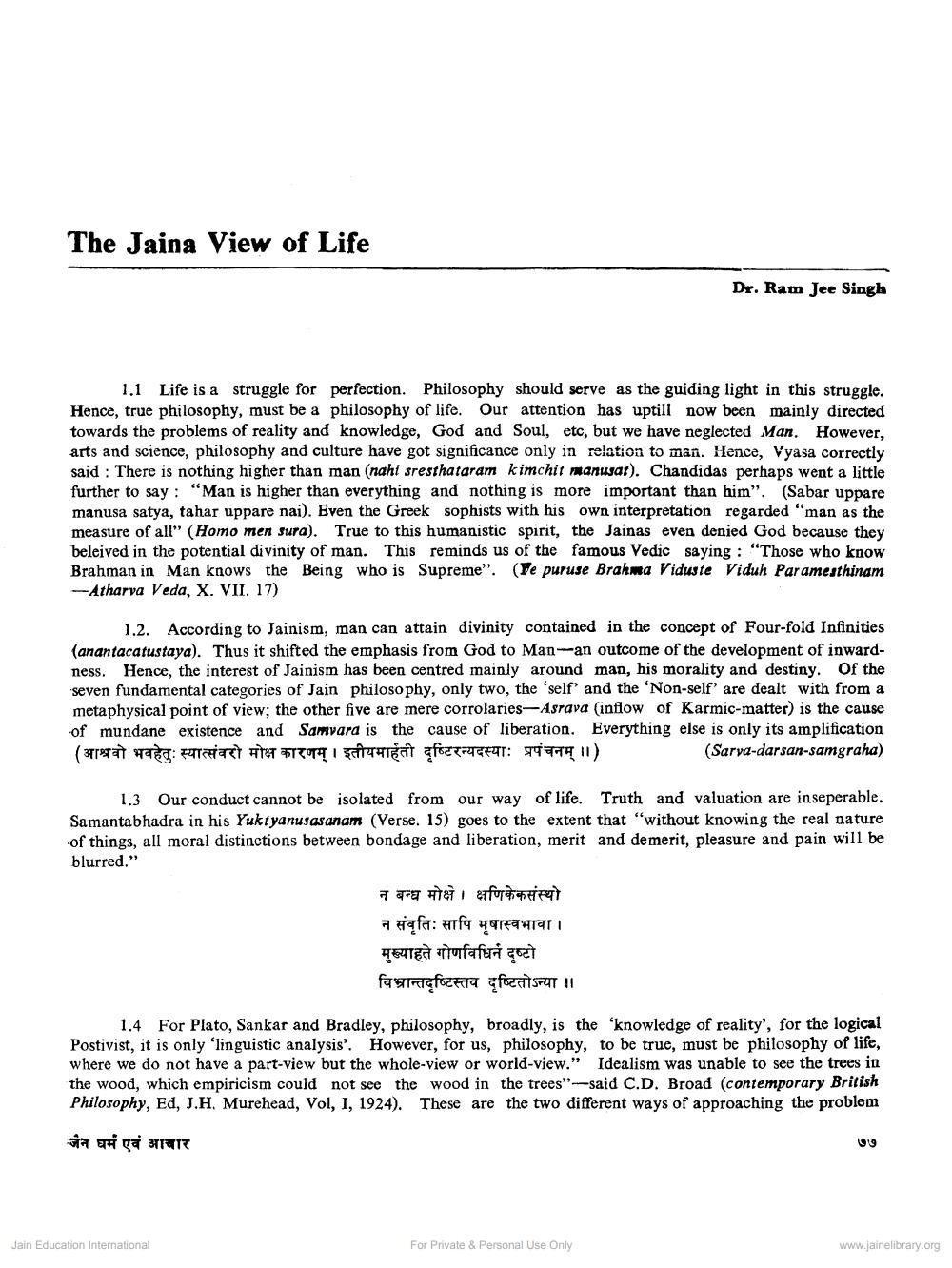Book Title: Jaina Value of Life Author(s): Ramjee Singh Publisher: Z_Deshbhushanji_Maharaj_Abhinandan_Granth_012045.pdf View full book textPage 1
________________ The Jaina View of Life Dr. Ram Jee Singh 1.1 Life is a struggle for perfection. Philosophy should serve as the guiding light in this struggle. Hence, true philosophy, must be a philosophy of life. Our attention has uptill now been mainly directed towards the problems of reality and knowledge, God and Soul, etc, but we have neglected Man. However, arts and science, philosophy and culture have got significance only in relation to man. Hence, Vyasa correctly said : There is nothing higher than man (nahi sresthataram kimchit manusar). Chandidas perhaps went a little further to say: "Man is higher than everything and nothing is more important than him". (Sabar uppare manusa satya, tahar uppare nai). Even the Greek sophists with his own interpretation regarded "man as the measure of all" (Homo men sura). True to this humanistic spirit, the Jainas even denied God because they beleived in the potential divinity of man. This reminds us of the famous Vedic saying: "Those who know Brahman in Man knows the Being who is Supreme". (Te puruse Brahma Viduste Viduh Paramesthinam -Atharva Veda, X. VII. 17) 1.2. According to Jainism, man can attain divinity contained in the concept of Four-fold Infinities (anantacatustaya). Thus it shifted the emphasis from God to Man-an outcome of the development of inwardness. Hence, the interest of Jainism has been centred mainly around man, his morality and destiny. Of the seven fundamental categories of Jain philosophy, only two, the ‘self and the 'Non-self' are dealt with from a metaphysical point of view; the other five are mere corrolaries-Asrava (inflow of Karmic-matter) is the cause of mundane existence and Samvara is the cause of liberation. Everything else is only its amplification ( 372 Waeg: FUTET ATT ATTUTTI Cirea aficzEFUT: 11 (Sarva-darsan-samgraha) 1.3 Our conduct cannot be isolated from our way of life. Truth and valuation are inseperable. Samantabhadra in his Yuktyanusasanam (Verse. 15) goes to the extent that "without knowing the real nature of things, all moral distinctions between bondage and liberation, merit and demerit, pleasure and pain will be blurred." न बन्ध मोक्षे। क्षणिकेकसंस्थो न संवृतिः सापि मृषास्वभावा । मुख्याहते गोणविधिनं दृष्टो विभ्रान्तदृष्टिस्तव दृष्टितोऽन्या ।। 1.4 For Plato, Sankar and Bradley, philosophy, broadly, is the knowledge of reality', for the logical Postivist, it is only 'linguistic analysis'. However, for us, philosophy, to be true, must be philosophy of life, where we do not have a part-view but the whole-view or world-view." Idealism was unable to see the trees in the wood, which empiricism could not see the wood in the trees"-said C.D. Broad (contemporary British Philosophy, Ed, J.H. Murehead, Vol, I, 1924). These are the two different ways of approaching the problem जैन धर्म एवं आचार Jain Education International For Private & Personal Use Only www.jainelibrary.orgPage Navigation
1 2 3 4
